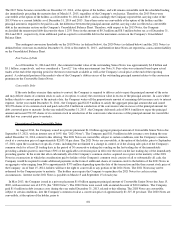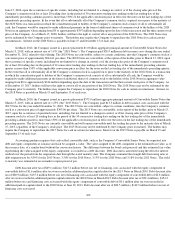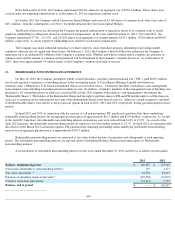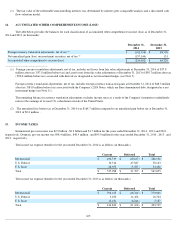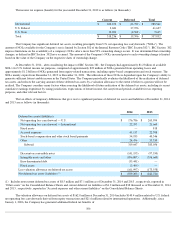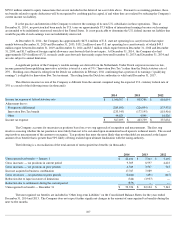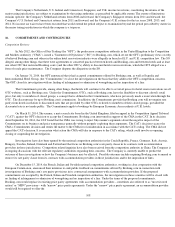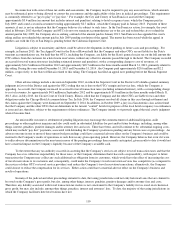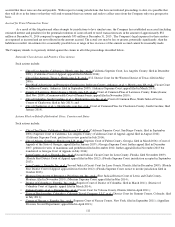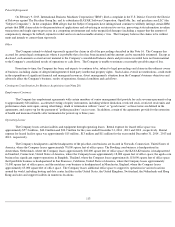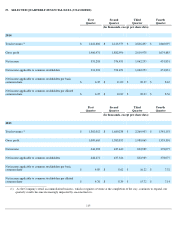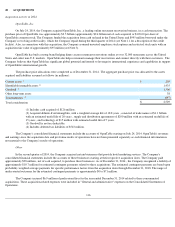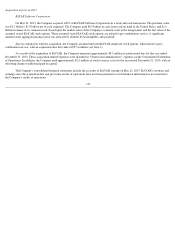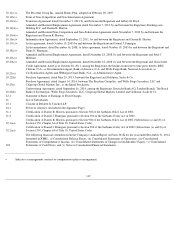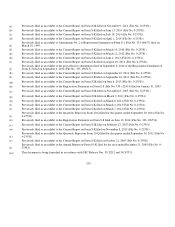Priceline 2014 Annual Report Download - page 115
Download and view the complete annual report
Please find page 115 of the 2014 Priceline annual report below. You can navigate through the pages in the report by either clicking on the pages listed below, or by using the keyword search tool below to find specific information within the annual report.
In connection with some of these tax audits and assessments, the Company may be required to pay any assessed taxes, which amounts
may be substantial, prior to being allowed to contest the assessments and the applicability of the laws in judicial proceedings. This requirement
is commonly referred to as "pay to play" or "pay first." For example, the City and County of San Francisco assessed the Company
approximately $3.4 million (an amount that includes interest and penalties) relating to hotel occupancy taxes, which the Company paid in
July 2009, and issued a second assessment totaling approximately $2.7 million , which the Company paid in January 2013. Payment of these
amounts, if any, is not an admission that the Company believes it is subject to such taxes. In the San Francisco action, for example, the court
ruled in February 2013 that the Company and OTCs do not owe transient accommodations tax to the city and ordered the city to refund the
amount paid in July 2009; the Company also is seeking a refund of the amount paid in January 2013. San Francisco has appealed the court's
ruling and has not refunded the amount paid in July 2009 pending resolution of the appeal. The matter has been stayed while the appeal in
another case with the City of San Diego is pending before the California Supreme Court.
Litigation is subject to uncertainty and there could be adverse developments in these pending or future cases and proceedings. For
example, in January 2013, the Tax Appeal Court for the State of Hawaii held that the Company and other OTCs are not liable for the State's
transient accommodations tax, but held that the OTCs, including the Company, are liable for the State's general excise tax on the full amount the
OTC collects from the customer for a hotel room reservation, without any offset for amounts passed through to the hotel. The Company recorded
an accrual for travel transaction taxes (including estimated interest and penalties), with a corresponding charge to cost of revenues, of
approximately $16.5 million in December 2012 and approximately $18.7 million in the three months ended March 31, 2013, primarily related to
this ruling. During the years ended December 31, 2013 and December 31, 2014 , the Company paid approximately $20.6 million and $2.2
million , respectively, to the State of Hawaii related to this ruling. The Company has filed an appeal now pending before the Hawaii Supreme
Court.
Other adverse rulings include a decision in September 2012, in which the Superior Court in the District of Columbia granted summary
judgment in favor of the District and against the OTCs ruling that tax is due on the OTCs' margin and service fees, which the Company is
appealing. As a result, the Company increased its accrual for travel transaction taxes (including estimated interest), with a corresponding charge
to cost of revenues, by approximately $4.8 million in September 2012 and by approximately $5.6 million in the three months ended March 31,
2013. Also, in July 2013, the Circuit Court of Cook County, Illinois, ruled that the Company and the other OTCs are liable for tax and other
obligations under the Chicago Hotel Accommodations Tax. In July 2014, the Company resolved all claims in this case through settlement and
the claims against the Company were dismissed on September 3, 2014. In addition, in October 2009, a jury in a San Antonio class action found
that the Company and the other OTCs that are defendants in the lawsuit "control" hotels for purposes of the local hotel occupancy tax ordinances
at issue and are, therefore, subject to the requirements of those ordinances. The Company intends to vigorously appeal the trial court's judgment
when it becomes final.
An unfavorable outcome or settlement of pending litigation may encourage the commencement of additional litigation, audit
proceedings or other regulatory inquiries and also could result in substantial liabilities for past and/or future bookings, including, among other
things, interest, penalties, punitive damages and/or attorney fees and costs. There have been, and will continue to be, substantial ongoing costs,
which may include "pay first" payments, associated with defending the Company's position in pending and any future cases or proceedings. An
adverse outcome in one or more of these unresolved proceedings could have a material adverse effect on the Company's business and could be
material to the Company's results of operations or cash flow in any given operating period. However, the Company believes that even if it were
to suffer adverse determinations in the near term in more of the pending proceedings than currently anticipated, given results to date it would not
have a material impact on the Company's liquidity because of the Company's available cash.
To the extent that any tax authority succeeds in asserting that the Company's services are subject to travel transaction taxes and that the
Company has a tax collection responsibility for those taxes, or the Company determines that it has such a responsibility, with respect to future
transactions the Company may collect any such additional tax obligation from its customers, which would have the effect of increasing the cost
of travel reservations to its customers and, consequently, could make the Company's travel reservation services less competitive (as compared to
the services of other OTCs or travel service providers) and reduce the Company's travel reservation transactions; alternatively, the Company
could choose to reduce the compensation for its services. Either action could have a material adverse effect on the Company's business and
results of operations.
In many of the judicial and other proceedings initiated to date, the taxing jurisdictions seek not only historical taxes that are claimed to
be owed on the Company's gross profit, but also, among other things, interest, penalties, punitive damages and/or attorney fees and costs.
Therefore, any liability associated with travel transaction tax matters is not constrained to the Company's liability for tax owed on its historical
gross profit, but may also include, among other things, penalties, interest and attorneys' fees. To date, the majority of the taxing jurisdictions in
which the Company facilitates hotel reservations have not
110



